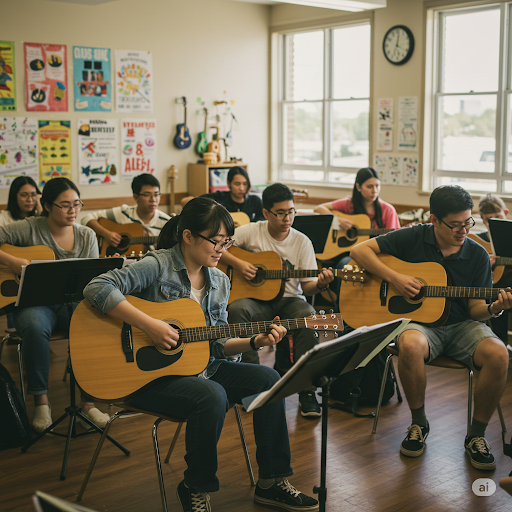Here’s our professional assessment of the top guitar learning approaches to consider:
Structured Learning Systems
The Suzuki Method
- Core Philosophy: Emphasizes ear training before reading notation
- Implementation: Daily listening to reference recordings, parent involvement, and gradual skill building
- Benefits: Strong development of musical ear and natural playing technique
- Best For: Young beginners and those who learn best by ear
Classical Conservatory Method
- Framework: Systematic progression through standardized repertoire and technical exercises
- Curriculum Elements: Focused study of proper hand positioning, sight reading, and technical precision
- Advantages: Comprehensive foundation in proper technique and music theory
- Ideal Applications: Students seeking formal training with academic rigor
Modern Method Books
- Popular Systems: Hal Leonard Guitar Method, Alfred’s Basic Guitar Method, Berklee Guitar Method
- Structure: Progressive lessons with accompanying audio demonstrations
- Key Features: Balanced approach to reading notation, chord diagrams, and technique building
- Application: Self-disciplined learners who benefit from clear sequential instruction
Online Learning Platforms
Video-Based Learning Services
- Leading Platforms: JustinGuitar, Guitar Tricks, Fender Play, TrueFire
- Delivery Format: Pre-recorded video lessons organized by skill level and musical style
- Strengths: Visual demonstration of techniques, flexible learning pace, extensive course libraries
- Investment Range: $15-30 monthly for premium subscriptions
Interactive Software Applications
- Notable Options: Yousician, Simply Guitar, Rocksmith+
- Technology Integration: Real-time feedback on timing and pitch accuracy
- Engagement Features: Gamification elements that track progress and reward achievement
- Best Suited For: Tech-savvy learners who respond well to immediate feedback systems
AI-Enhanced Learning Tools
- Emerging Solutions: Chord recognition apps, automated feedback systems
- Distinctive Capabilities: Personalized practice recommendations based on performance analysis
- Implementation Considerations: Supplements rather than replaces traditional instruction
- Current Limitations: Still developing in accuracy and depth of feedback
Personalized Instruction Models
Private Instruction
- Format Options: In-person or virtual one-on-one sessions
- Customization Level: Highly tailored to individual learning styles and goals
- Professional Benefits: Personalized feedback, immediate correction of technique issues
- Investment Consideration: Premium pricing ($30-100/hour) reflects individualized attention
Group Learning Environments
- Configurations: Small group lessons, community workshops, guitar circles
- Community Advantages: Peer motivation, collaborative learning, performance opportunities
- Instructional Approach: Balanced attention to common fundamentals with individual application
- Value Proposition: Cost-effective while maintaining instructional quality
Intensive Immersion Programs
- Format: Weekend workshops, music camps, masterclasses
- Acceleration Factors: Concentrated instruction, immersive environment, expert guidance
- Professional Development: Networking opportunities with instructors and fellow students
- Implementation Strategy: Excellent for breaking through plateaus or exploring specialized techniques
Self-Directed Learning Frameworks
Project-Based Learning
- Methodology: Learning through complete song acquisition or composition projects
- Implementation Strategy: Select progressively challenging musical pieces as skill benchmarks
- Engagement Factor: High motivation through tangible achievement milestones
- Support Requirements: Supplemental resources for technique development
The Transcription Method
- Core Practice: Learning songs by ear and creating your own written or mental notation
- Skill Development: Builds superior listening skills, fretboard knowledge, and musical intuition
- Professional Application: Widely used by performing musicians across genres
- Resource Requirements: Quality audio equipment and reference recordings
Mentorship Networks
- Structure: Informal guidance from experienced players or online communities
- Value Elements: Real-world perspective, stylistic authenticity, performance opportunities
- Implementation Strategy: Combine with structured methods for comprehensive development
- Community Resources: Local music scenes, online forums, guitar meetup groups
Methodological Integration Strategy
The most successful guitar students typically combine multiple learning methods tailored to their specific goals, learning style, and schedule constraints. Our professional recommendation is to establish a primary learning system supplemented by complementary approaches that address specific development needs.
